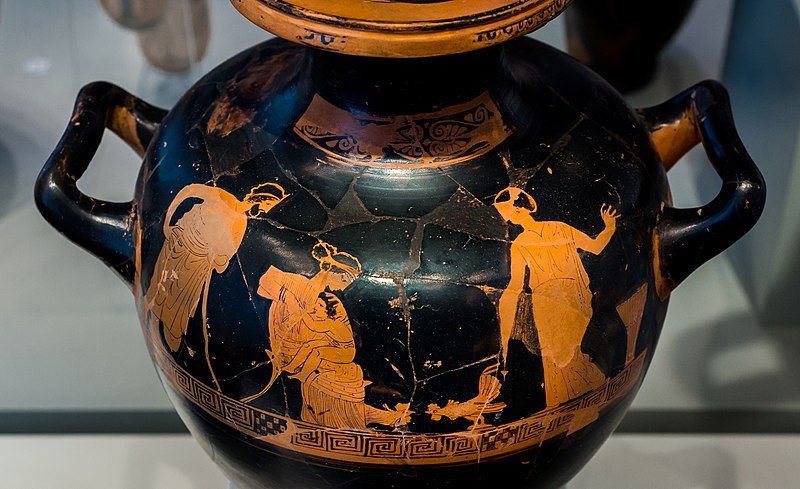In more horrifying news from the border, Texas troopers have been told to push children back into the Rio Grande. Here’s a reminder that state sanctioned violence against children is an ancient practice of imperial states, whether they are dictatorships or democracies
Velleius Paterculus 2.28
“The evils of the civil war seemed to have ended when they were rekindled by Sulla’s cruelty. Once he was made dictator—and this honor had been avoided for a hundred and twenty years since the last time it had been used was one year after Hannibal quit Italy—and it is obvious that the fear which prompted the Roman people to want a dictator was less than how much they feared his power. As dictator, Sulla applied the power which earlier dictators had used only to save the country from the greatest dangers with unmeasured degrees of savagery.
He was the first—and I wish he had been the last—to discover the model of proscription with the result that in the same state in which legal recourse is available to an actor booed from the stage, in that state a price was set for the murder of a Roman citizen: he would have the most who killed the most! The reward for the killing of an enemy would be no greater than for the murder of a citizen.
In essence, each man was valued for the price of his own death. Such savagery was applied not only to those who had carried arms against them, but against many innocents too. In addition to this, the goods of the proscribed were offered for sale: children already deprived of their father’s goods were also prohibited from the right of seeking public office and, the most unjust thing of all, they had to maintain the standards of their social rank without recourse to the rights.”
Videbantur finita belli civilis mala, cum Sullae crudelitate aucta sunt. Quippe dictator creatus (cuius honoris usurpatio per annos centum et viginti intermissa; nam proximus post annum quam Hannibal Italia excesserat, uti adpareat populum Romanum usum dictatoris haud metu desiderasse tali quo timuisset potestatem) imperio, quo priores ad vindicandam maximis periculis rem publicam olim usi erant, eo in inmodicae crudelitatis licentiam usus est.3 Primus ille, et utinam ultimus, exemplum proscriptionis invenit, ut in qua civitate petularitis convicii iudicium histrioni ex albo redditur, in ea iugulati civis Romani publice constitueretur auctoramentum, plurimumque haberet, qui plurimos interemisset, neque occisi hostis quam civis uberius foret praemium Geretque quisque merces mortis suae.4 Nec tantum in eos, qui contra arma tulerant, sed in multos insontis saevitum. Adiectum etiam, ut bona proscriptorum venirent exclusique paternis opibus liberi etiam petendorum honorum iure prohiberentur simulque, quod indignissimum est, senatorum filii et onera ordinis sustinerent et iura perderent.
During the Peloponnesian War, the Athenian Democracy deliberated on and voted for the killing of men and the enslavement of women and children. To ask why is not an idle historical musing.
Thucydides, 5.116.4
“The [Athenians] killed however many of the Melian men were adults, and made the women and children slaves. Then they settled the land themselves and later on sent five hundred colonists.”
οἱ δὲ ἀπέκτειναν Μηλίων ὅσους ἡβῶντας ἔλαβον, παῖδας δὲ καὶ γυναῖκας ἠνδραπόδισαν. τὸ δὲ χωρίον αὐτοὶ ᾤκισαν, ἀποίκους ὕστερον πεντακοσίους πέμψαντες.
5.32
“Around the same period of time in that summer, the Athenians set siege to the Scionaeans and after killing all the adult men, made the women and childen into slaves and gave the land to the Plataeans.”
Περὶ δὲ τοὺς αὐτοὺς χρόνους τοῦ θέρους τούτου Σκιωναίους μὲν Ἀθηναῖοι ἐκπολιορκήσαντες ἀπέκτειναν τοὺς ἡβῶντας, παῖδας δὲ καὶ γυναῖκας ἠνδραπόδισαν καὶ τὴν γῆν Πλαταιεῦσιν ἔδοσαν νέμεσθαι·
This was done by vote of the Athenian democracy led by Cleon: Thucydides 4.122.6. A similar solution was proposed during the Mytilenean debate. Cleon is described by Thucydides as “in addition the most violent of the citizens who also was the most persuasive at that time by far to the people.” (ὢν καὶ ἐς τὰ ἄλλα βιαιότατος τῶν πολιτῶν τῷ τε δήμῳ παρὰ πολὺ ἐν τῷ τότε πιθανώτατος, 3.36.6)
3.36
“They were making a judgment about the men there and in their anger it seemed right to them not only to kill those who were present but to slay all the Mytileneans who were adults and to enslave the children and women.”
περὶ δὲ τῶν ἀνδρῶν γνώμας ἐποιοῦντο, καὶ ὑπὸ ὀργῆς ἔδοξεν αὐτοῖς οὐ τοὺς παρόντας μόνον ἀποκτεῖναι, ἀλλὰ καὶ τοὺς ἅπαντας Μυτιληναίους ὅσοι ἡβῶσι, παῖδας δὲ καὶ γυναῖκας ἀνδραποδίσαι.
In his speech in defense of this policy, Cleon reflects on the nature of imperialism and obedience. Although he eventually failed to gain approval for this vote which was overturned, his arguments seem to have worked on later occasions.
Thucydides, 3.37
“The truth is that because you live without fear day-to-day and there is no conspiring against one another, you think imagine your ‘allies’ to live the same way. Because you are deluded by whatever is presented in speeches you are mistaken in these matters or because you yield to pity, you do not not realize you are being dangerously weak for yourselves and for some favor to your allies.
You do not examine the fact that the power you hold is a tyranny and that those who are dominated by you are conspiring against you and are ruled unwillingly and that these people obey you not because they might please you by being harmed but because you are superior to them by strength rather than because of their goodwill.
The most terrible thing of all is if nothing which seems right to us is established firmly—if we will not acknowledge that a state which has worse laws which are unbendable is stronger than a state with noble laws which are weakly administered, that ignorance accompanied by discipline is more effective than cleverness with liberality, and that lesser people can inhabit states much more efficiently than intelligent ones.
Smart people always want to show they are wiser than the laws and to be preeminent in discussions about the public good, as if there are no more important things where they could clarify their opinions—and because of this they most often ruin their states. The other group of people, on the other hand, because they distrust their own intelligence, think that it is acceptable to be less learned than the laws and less capable to criticize an argument than the one who speaks well. But because they are more fair and balanced judges, instead of prosecutors, they do well in most cases. For this reason, then, it is right that we too, when we are not carried away by the cleverness and the contest of intelligence, do not act to advise our majority against our own opinion.”
διὰ γὰρ τὸ καθ᾿ ἡμέραν ἀδεὲς καὶ ἀνεπιβούλευτον πρὸς ἀλλήλους καὶ ἐς τοὺς ξυμμάχους τὸ αὐτὸ ἔχετε, καὶ ὅ τι ἂν ἢ λόγῳ πεισθέντες ὑπ᾿ αὐτῶν ἁμάρτητε ἢ οἴκτῳ ἐνδῶτε, οὐκ ἐπικινδύνως ἡγεῖσθε ἐς ὑμᾶς καὶ οὐκ ἐς τὴν τῶν ξυμμάχων χάριν μαλακίζεσθαι, οὐ σκοποῦντες ὅτι τυραννίδα ἔχετε τὴν ἀρχὴν καὶ πρὸς ἐπιβουλεύοντας αὐτοὺς καὶ ἄκοντας ἀρχομένους, οἳ οὐκ ἐξ ὧν ἂν χαρίζησθε βλαπτόμενοι αὐτοὶ ἀκροῶνται ὑμῶν, ἀλλ᾿ ἐξ ὧν ἂν ἰσχύι μᾶλλον ἢ τῇ ἐκείνων εὐνοίᾳ περιγένησθε.
πάντων δὲ δεινότατον εἰ βέβαιον ἡμῖν μηδὲν καθεστήξει ὧν ἂν δόξῃ πέρι, μηδὲ γνωσόμεθα ὅτι χείροσι νόμοις ἀκινήτοις χρωμένη πόλις κρείσσων ἐστὶν ἢ καλῶς ἔχουσιν ἀκύροις, ἀμαθία τε μετὰ σωφροσύνης ὠφελιμώτερον ἢ δεξιότης μετὰ ἀκολασίας, οἵ τε φαυλότεροι τῶν ἀνθρώπων πρὸς τοὺς ξυνετωτέρους ὡς ἐπὶ τὸ πλέον ἄμεινον οἰκοῦσι τὰς πόλεις.
οἱ μὲν γὰρ τῶν τε νόμων σοφώτεροι βούλονται φαίνεσθαι τῶν τε αἰεὶ λεγομένων ἐς τὸ κοινὸν περιγίγνεσθαι, ὡς ἐν ἄλλοις μείζοσιν οὐκ ἂν δηλώσαντες τὴν γνώμην, καὶ ἐκ τοῦ τοιούτου τὰ πολλὰ σφάλλουσι τὰς πόλεις· οἱ δ᾿ ἀπιστοῦντες τῇ ἐξ ἑαυτῶν ξυνέσει ἀμαθέστεροι μὲν τῶν νόμων ἀξιοῦσιν εἶναι, ἀδυνατώτεροι δὲ τὸν1 τοῦ καλῶς εἰπόντος μέμψασθαι λόγον, κριταὶ δὲ ὄντες ἀπὸ τοῦ ἴσου μάλλον ἢ ἀγωνισταὶ ὀρθοῦνται τὰ πλείω. ὣς οὖν χρὴ καὶ ἡμᾶς ποιοῦντας μὴ δεινότητι καὶ ξυνέσεως ἀγῶνι ἐπαιρομένους παρὰ δόξαν τῷ ὑμετέρῳ πλήθει παραινεῖν.

Like this:
Like Loading...









